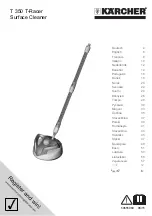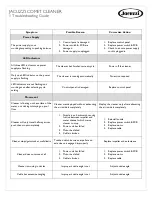
6/
Maintenance
30/38
1786-001 en/2022-08
6.3 Performing the foil test
Before the first use and at regular intervals, e.g. every 3 months, a
foil test should be conducted. This serves to ensure the consistent
effect of the ultrasound. The frequency with which these tests are
carried out is your responsibility.
The foil test is a simple procedure to demonstrate the intensity and
distribution of cavitation in an ultrasonic bath. It involves stretching
aluminium foil over a foil test frame. This frame will be perforated
or destroyed to a certain degree by cavitation, depending on the
sonication time.
In order to compare the results, it is
important for the conditions of
the foil test to always remain the same
:
• Filling the oscillating tank to the filling level mark,
• Temperature of the sonication liquid,
• Degassing time,
• Frame positioning,
• Foil type (brand, thickness),
• Sonication time,
• Type and concentration of the ultrasound preparation.
liquid for the foil test
In order to obtain a sufficiently strong cavitation effect, the foil test
also requires the surface tension of the water used to be reduced
using surfactant preparations.
We recommend the following ultrasound preparations:
• TICKOPUR R 33,
• TICKOPUR R 30,
• TICKOPUR TR 7.
If none of these products are available, a neutral or mildly alkaline
product that does not destroy aluminium may be used. The product
must be approved by the manufacturer for use in ultrasonic baths.
Test results and documentation
Assuming constant test conditions, the test result is evaluated
based on the perforated surfaces of the foils. The perforated sur-
faces of all foils should have approximately the same reach and dis-
tribution – they are never identical. Consistency of process
validations, e.g. for the treatment of medical devices, can only be
ensured through regular foil tests.
Содержание 184XIB.00158520.001
Страница 36: ...8 Device information 36 38 1786 001 en 2022 08 ...
Страница 37: ...1786 001 en 2022 08 37 38 ...








































